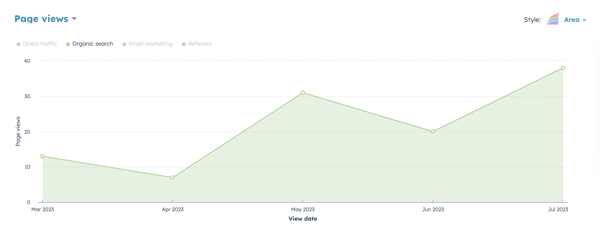Search engines create valuable opportunities for brands to reach the right prospect at the right moment. By choosing accurate, relevant keywords, brands can boost their content’s ranking, creating visibility and authority for their content and driving conversions.
So, the more keywords on each page, the better, right? Unfortunately, not…
Focusing on the same keywords across multiple pages can lead to keyword cannibalization, negatively impacting search engine optimization (SEO) for the entire website.
What Is Keyword Cannibalization?
Keyword cannibalization occurs when a brand targets the same keyword across multiple pieces of content. When this happens, multiple pages from the same brand can appear when prospects search the keyword.
The pages compete for attention, cannibalizing the results by splitting them between two or more pieces of content. SEO keyword cannibalization diminishes authority, lowers click-through rate (CTR), and drags down conversions. Luckily, it’s not as scary as it sounds — and it’s a pretty easy fix.
The first step is recognizing the problem.
Recognizing the Signs of Keyword Cannibalization
Before fixing keyword cannibalization, you must recognize what’s happening. Here are some key indicators that cannibalization may be a problem for your site:
- Drop in search rankings
- Decreased organic traffic
- Confusion in search engine results pages (SERPs)
Fresh content should increase traffic and help a brand reach its key performance indicators (KPIs). If you publish new content and your results worsen, keyword cannibalization may be to blame.
Common Causes of Keyword Cannibalization
A few base issues lay at the root of almost all keyword cannibalization:
- Similar content across pages: Does your site have multiple pages dealing with the same topics? Content with heavy overlap can make cannibalizing keywords easy. Keep content unique and specific.
- Lack of proper site structure: A poorly organized website with incorrect hierarchy can disrupt SEO. A “parent” page should have the highest authority and link to unique variations (“child” pages) with their own focused keywords.
- Over-optimization of keywords: Sometimes called keyword stuffing, over-optimization can trigger penalties from search engines programmed to weed out junky and irrelevant content. It can also be frustrating for savvy users who will quickly recognize when keywords are being overused or incorrectly applied.
If you suspect that your content is suffering from one or more of these issues, take steps to solve the problem as soon as possible. Failure to solve keyword cannibalization issues can have compounding effects over time.
Long-Term Impact of Keyword Cannibalization on SEO
When keyword cannibalization issues go unsolved, it can negatively impact a brand long-term. When SEO is poor, it dilutes brand relevance, causing users to look elsewhere for a more authoritative source. 
Additionally, when users search for a term and several articles from the same brand rank for that keyword, both users and search engines can become confused. The search engine may incorrectly deprioritize the more relevant article, leading to lost conversions and frustrated prospects.
An equally important but less visible consequence is wasted crawling and indexing budgets. Search engines only allot a specific amount of crawl and index time to each site, and the results can affect long-term ranking. If your site is small, this may have little impact, but larger sites must use this limited budget as efficiently as possible.
Strategies to Prevent and Resolve Keyword Cannibalization
Keyword cannibalization is a serious problem, but it’s avoidable and fixable with some expertise. Taking precautions and applying some remediation can solve cannibalization issues quickly.
Comprehensive Keyword Research
Choosing the right keywords for your content is vital. There are many tools available to assist in keyword research. At LAIRE, we love Semrush. When used by a marketing expert, these tools can help brands identify unique, high-value keywords to help the right prospects find their content at the right time.
Content Consolidation
If keyword cannibalization is already a problem, part of the solution may be consolidating similar or overlapping content. Brands can merge content with too much overlap into a single, more authoritative piece — but be sure to avoid over-optimization and keyword stuffing when doing so.
Sometimes, there are better options than merging. If one piece of content outperforms the others, brands can use redirects to bypass lower-performing content.
Strategic Internal Linking
Strong internal linking helps to guide search engines to the right page. It also enhances the user experience by providing smooth and natural site navigation, leading to a high CTR and conversions.
Clear Site Structure and URL Hierarchy
When a site is well-structured, users and search engines can more easily understand what a brand offers. Brands should organize web content thematically with a URL structure optimized for clarity. If a user wants to share a link from your brand’s site, you want that link to be clear, descriptive, and short.
Part of a clear site structure is ensuring that each page offers a unique value, which means it will have unique and valuable keywords.
Regular Content Audits and Reviews
As in any venture, maintenance is crucial. Continue monitoring and adjusting internal links over time. Ensure all content meets performance criteria and KPIs, and make strategic changes if it falls short.
Case Study: Real-Life Examples of Keyword Cannibalization
How does keyword cannibalization mitigation play out in real life? Here’s an example from the LAIRE website.
Over the past few years, we published three separate blog posts targeting the keyword “social media marketing tips.”
Upon assessing the posts’ performance for all of 2022, it was clear that all three consistently underperformed. Each blog got fewer than 25 views throughout the span of the entire year. Plus, all had fewer than ten entrances, and view times per page were low.
In 2023, LAIRE consolidated these three posts into a more authoritative piece of content:
- We combined relevant content from each blog to create a comprehensive article.
- We updated the best-performing post in HubSpot with the new and improved content.
- For the updated article, we optimized the headers, title tag, meta description, and URL for the intended keyword “social media marketing tips.”
- For the other worse-performing articles, we unpublished them and added 301 redirects so the URLs would bring the reader to the new consolidated piece of content.
The result? In July 2023, the new blog post got 51 views and 37 entrances, with an average view time of 2.7 minutes. In just one month, it outperformed the old posts’ performance throughout an entire year.
The numbers don’t lie; keyword cannibalization can hurt SEO. But the numbers also prove that fixes are available and effective when applied correctly.
Solving for Keyword Cannibalization
It doesn’t matter how great a brand or product is if prospects can’t find it. Brands must consider SEO strategy to stay visible, relevant, and authoritative. Issues like keyword cannibalization can lower site traffic and harm ranking, leading to lost business.

